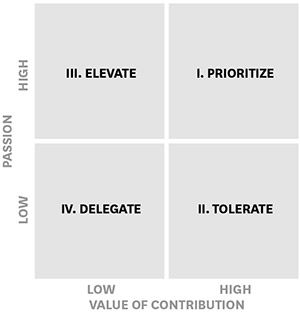first mentor was the Chief of Medicine at the VA Ann Arbor Healthcare System Dr. Sanjay Saint. At the end of our first rotation together he told me that he believed in me, and that he would be happy to support me as a mentor. It meant so much knowing there was someone who could help me navigate a new career world.
He and other mentors helped me see the specific path that I could take to succeed as a resident and beyond. With my personality, I needed to know the exact blueprint to build a successful career in academic medicine. Seeing my mentors’ success—and their willingness to admit some of their missteps as well—fueled my passion for helping others find their own optimal career path.
1. Prioritize your work
Many people who start out in academic medicine and research want to do it all. You overcommit, taking on more projects or more work than you can handle because you don’t want to say no. When you can’t do it all, you end up looking worse than if you had simply said no. Or maybe you accomplish everything you committed to, but at the expense of your life outside work.
Which Tasks Should You Prioritize?
Focus on those that align your passion with where you can contribute most.

Credit: Amy Jen Su, HBR 2017
What it’s like in practice
-
Build a buffer: We often underestimate how long it will take to do something, especially early in your career. As you plan out projects and timelines, add 25% to 50% more time over how long you think it will take.
-
Tackle hard tasks first: Start by completing the things that you least want to do. For me that is IRBs or writing first thing in the morning, when I have more motivation and energy.
-
Create a calendar: In addition to meetings, trainings, and classes, add blocks of time to work on specific projects. This can help you avoid procrastinating, or worse, forgetting about a project or assignment (Learn to master Outlook here).
-
Under-promise and over-deliver: The way you frame your time sets the stage for how others perceive you. If you promise to get something done in two months and it takes three, people perceive you as undependable and late. But if you promise it in three and deliver it in two, people know you as someone who meets deadlines.
2. Make yourself irreplaceable and indispensable
The best team members are people who proactively work to improve your workplace. Think about your pain points at work. Chances are those things are also a problem for colleagues. When you take the initiative and fill a void that everyone is experiencing, you become an invaluable member of the team.
What it’s like in practice
If you work in a clinical space and notice long delays in getting ultrasounds done, you can become the point of care person who knows how to speed up the ultrasound process. Then train your colleagues on your processes. One member of our team heard frequent complaints that people didn’t have the data they need to improve operations. He trained himself how to find and analyze that data, and now whenever someone needs that information they know to go to him.
Once you fill that void, you have more power to negotiate for resources to keep improving. It can also make you an indispensable part of a team, which is a good position in your career.
Mentee Missteps
Click here to read about over committing, not saying no, and not being honest about failures.
3. Learn how to say no
For most people, saying yes is natural when someone asks for help. That is especially true at work, where we all want to be seen as a “team player,” and we don’t want to disappoint our boss or our peers. Early on in your career it’s a good idea to take on as many projects as you can (keeping in mind the tips from above to manage your time well). As you get busier, you must learn how to say no. Taking on too many projects or assignments leaves you feeling stressed and stretched thin. Instead of doing a great job on one or two projects, you will do a mediocre or poor job on everything.
I read a book called The Power of a Positive No by William Ury, which teaches the importance of discovering your own internal values first. As people request your time, you can evaluate it within the framework of your values. Does this perfectly align with my mission and goals? If so, it’s a definite yes. If not, evaluate it a little more before saying yes or no.
What it’s like in practice
Rather than immediately saying yes or no, ask the requestor a couple questions:
-
Why is this important to you?
-
Why did you think of me for this project?
If it’s a request from a mentor or a supervisor, they may have a reason for asking you. For example, they may believe that it can expand your skills or that it aligns with your goals in a way you aren’t immediately seeing. Sometimes that will change your answer from no to yes. When it doesn’t align with your goals, you have a reason for turning it down.
The last step if you do say no is to figure out if you can “end with a yes.” Perhaps you suggest someone else who could help. Or if it’s a timing issue, say you can help later if the project can wait. Ending with a yes helps you honor your own limits while also maintaining relationships.
When things don’t go as planned
Even with the best plans in place, sometimes things go wrong. You may not be able to complete a task in the time you estimated or you’re running into unforeseen roadblocks. Be honest about your own limitations, and ask for help from a mentor.
There are also situations where it’s time to end a mentor/mentee relationship—for example, when you are moving in a new research or career direction. Let your mentor or mentee know you appreciated working together, and will keep in touch if your paths cross in the future.
Sometimes you need to move on because of personality issues. The academic world can be small, and making enemies can hurt your career progression. The best advice I can give is to try not to reach a point where you have to destroy a relationship—either as a mentor or a mentee. Be clear about your goals and your expectations from the start. Get to know each other personally (as professionals). Talk to other people who work with someone to get a sense of their personality, and try to spot red flags in advance.
It’s okay when things don’t work out. Sometimes the best thing you can do is end a mentor/mentee relationship as professionally as possible and move on.
Valerie Vaughn
In the new series Book Club for Busy People, Accelerate shares highlights of books we’re hearing about from the community. First up: how thinking about others’ needs strengthens teams and increases civility in The Outward Mindset.
Learners, patients, and teachers are more confident and inspired when we take time to create positive learning environments. Pediatric endocrinologist Kathleen Timme gives practical advice for integrating key aspects of a positive learning environment into your daily interactions.
To disagree means failing to agree. Synonyms include to contradict, challenge or debate. Synonyms do not also have to include to argue, quarrel, dispute, bicker or clash. Pediatric intensivist Jared Henricksen shares the best path forward when words become clouded with emotion.
